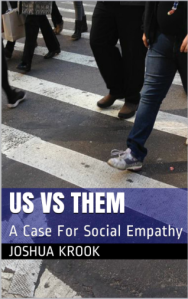Due to evolution, when our enemy is hurt, we celebrate. When our enemy is killed, we chant in the streets. When many of our enemies are killed we declare: “mission accomplished” on an aircraft carrier. Survival of our ‘tribe’ mandates joy at the death of our enemies just as it mandates sadness at the death of our allies. This is how primitive societies survived, by caring for their kin and killing their foes.
The joy we experience at the pain of others is called Schadenfreude. It’s a German word encompassing enjoyment at the suffering, pain and troubles of others. Schadenfreude is the opposite of empathy and is generally directed towards people “outside” our own group. It would be difficult to imagine American citizens feeling “joy” at the death of their own soldiers, for example. American soldiers, just as American citizens, belong to an “ingroup”: a group of commonality and similarity of citizenship and “values”. This makes the common American soldier a person with whom many American citizens can empathise. They feel a common “unity” of identity, blurring self and other to unite behind nationality, citizenship and loyalty to “God and country”. This same empathy does not exist for enemy soldiers, who are “rivals” in the ultimate sense, and a threat to the citizen’s own very existence.
The above military example may seem extreme, however everyday examples exist. The classic example a sports fans who has a vested interest in his team’s success. Through this vested interest a fan experiences schadenfreude when the “rival” or “enemy” team fails or is ‘hurt’ in some way.[i] Indeed, the threat of “inferiority” can be enough to trigger schadenfreude toward a rival group. Hence, when one group competes with another, and the first group is shown to be weaker in some way, schadenfreude can substitute as a form of emotional “revenge” upon the stronger team.[ii] Sports fans risk feeling inferiority of sporting prowess if their own team loses a particular match. This looming threat of inferiority, along with their vested interest in the team’s success, contributes to feelings of schadenfreude.
“Red Sox and Yankees Fan report feeling pleasure, and show activity in reward-related brain regions… when they watch their rival [team] fail to score against their favored baseball team, and also against a less competitive team in the same league.”[iii]
This feeling of schadenfreude can extend into associated merchandise. Sports fans may come to “detest” companies who “sponsor a rival team”, just as they are more inclined to like companies who sponsor their own team.[iv]
It can be theorized that the proliferation of fights that break out between soccer fans in the UK, Europe, Brazil and elsewhere may portray this schadenfreude by association.[v] When a fan becomes fanatical, they can begin to feel schadenfreude towards a rival team’s fans and enjoy the experience of hurting their “rivals”, as if hurting the rival team itself.[vi] Due to the nature of competition, fans can see themselves as ‘insiders’ of a group, and rivals as ‘outsiders’.
Political parties are formulated on a similar basis of competition, diminished empathy and enhanced schadenfreude between ‘rival’ groups.[vii] The premise of democracy is that a political party’s success depends on a rival party’s failure. Elections are structured as a conflict of “us” vs. “them”, and in this manner, empathy is drastically diminished between rival political groupings. “Us” vs. “them” ideologies distance political groups from one another through language and allow mutual empathy to decline. This is one reason why modern political parties are so vitriolic, because they simply do not care about each other, and indeed are structured in a system that makes it harder for them to care about each other. Instead, they actively gain enjoyment from each other’s pain.
“The domain of politics is prime territory for feelings of schadenfreude, especially for people strongly identified with political parties… This is clearly the case for events that [are] simply embarrassing in nature, but also for events that are … ‘‘objectively” harmful all around, such as a downturn in the economy or… harm suffered by troops.”[viii]
In a system of mutual schadenfreude it can be asked, what mutually beneficial policies can be enacted? How can change occur if the major parties hate each other or enjoy seeing each other in pain?
 Opposition members experience joy at a government’s incompetence, even if the incompetence affects their own lives. Party allegiance makes it difficult to see how bipartisan solutions can be worked out that benefit the entire country.
Opposition members experience joy at a government’s incompetence, even if the incompetence affects their own lives. Party allegiance makes it difficult to see how bipartisan solutions can be worked out that benefit the entire country.
We have seen this schadenfreudian dynamic play out nationally with the vitriolic opposition of Tony Abbott (2009-2013). Abbott enjoyed watching the government fail and in fact celebrated their ‘incompetence’, regularly speaking about it in the media. One can ask: why would someone celebrate economic mismanagement, when that mismanagement could affect their own life? The answer: in a group we tend to lose part of our own identity and take on the identity of the group. In politics, part of the “group” identity is a dislike of the opposition. In such an environment it becomes easy to tell why people like Tony Abbott can reach political heights – riding on the back of negativity. It is not surprising that he enjoyed watching the government’s “incompetence” – for watching your rival tear itself to shreds is enjoyable in competitive systems.
Schadenfreude can be diminished by limiting competition between different groups and diminishing facades of rivalry. Groups will experience more empathy, in situations where there are common, mutual goals, rather than competition for the same goals. Dialogues of superiority and inferiority have to be set aside in this environment, rather than actively encouraged, as they are in the political arena.
This is obviously very difficult to establish for certain groups. Take for example rich and poor, or dialogues of superiority vs. oppression in race relations. Ironically much of the existing “competition” between these groups may be contributing towards a growing lack of empathy between them. In this way, the poor who antagonize the rich and “compete” for resources only expose themselves to the risk of decreasing empathy on the part of the rich and indeed schadenfreude. In a similar vein, the rich who “compete” with the poor for political power expose themselves to the risk of decreasing empathy on the part of the poor and indeed schadenfreude. Through competition, both parties proliferate mutual suffering. And indeed, both enjoy watching the other suffer.
One could argue that instead, if both see each other in unity, aiming for mutual enrichment as a common goal – empathy can be more readily established. It is difficult to separate these assertions from political undertones. However, the doctrines of empathy pay no attention to colour or creed, or indeed political affiliation. Rather, they are empowered to overcome oppression through mutual empowerment, mutual respect and understanding. It is hoped that through the creation of mutual empathy, social policy can flourish: in that self-interest can decline in favour of common interest or the interests of helping others. Common interest need not entail self sacrifice, as is commonly vaunted. However empathy does make self-sacrifice more tolerable, if it is required.
Indeed, this transformation has already occurred at an international level, with the United Nations and other institutions aiming for common benefit rather than competition. In this manner peaceful coexistence can be established, moving towards mutual goals and restoring empathy across structural divides. In terms of international relations, it is an idea that harks back to the end of the Cold War, where rival powers ‘competed’ for ideological domination over the world.
Setting this rivalry aside, Zhou Enlai, Chinese Premier, said that there must be: “peaceful coexistence between countries with different political systems”.[ix] Instead of competing for the world, they should aim for “equality” and “mutual benefit”.[x] By reframing the discussion in this manner –from competition to mutual benefit- Enlai helped to establish the beginnings of trade and diplomatic relations between the US and China. He cautioned against competition – which he foresaw led to war and suffering, and instead proponed five principles of “peaceful coexistence”. Unwittingly perhaps, Enlai laid the foundational principles that were to establish mutual empathy between several nations. Former Australian Prime Minister Bob Hawke once celebrated Enlai’s principles. He called the goal of “mutual benefit” something that would create a safer world in a “spirit of cooperation”; something that the world sorely lacked at the time.[xi]
It is this “spirit of cooperation” that needs to be restored to our day-to-day lives. Instead of competing with rival groups (be they rival ideologies, religions, political groups, sporting groups, cliques and so on), and enjoying watching them suffer, we should instead unite behind our commonality: the spirit of humanity. Simply put, we can unite behind the fact that we are human. Through this we can reestablish empathy. By ignoring our assigned categories, we can ignore the competitive streak inside each of us, and establish bonds with all sorts of different people, regardless of their background. Once we care for each other, we might treat each other better and establish social policies that benefit the entire country, rather than sectionalized interests. Part of this process is getting rid of competing categories and meeting together, to talk, to discuss and to gain a mutual understanding of each other regardless of our ‘group’ affiliations.
This is an extract from my book: “Us vs Them: A Case For Social Empathy”.
—————————————————————————————
@JoshKrook
Bibliography:
[i] Colin Wayne Leach, Russell Spears, Nyla R Branscombe, Bertjan Doosje, ‘Malicious Pleasure: Schadenfreude at the Suffering of Another Group’, Journal of Personality and Social Psychology;
[ii] Colin Wayne Leach, Russell Spears, Nyla R Branscombe, Bertjan Doosje, ‘Malicious Pleasure: Schadenfreude at the Suffering of Another Group’, Journal of Personality and Social Psychology;
- H. Smith, T.J. Turner, R. Garzonzik, C.W. Leach, V. Urch, C. Weston, ‘Envy and schadenfreude’, Personality and Social Psychology Bulletin (1996), 22, 158-168.
[iii] Mina Cikara, Emile G. Bruneau, Rebbeca R. Saxe, ‘Us and Them: Intergroup Failures of Empathy’, Current Directions in Psychological Science (2011) 20:3, 149—153
[iv] Vassilis Dalakas, Joanna Phillips Melancon, ‘Fan Identification, Schadenfreude toward hated rivals, and the mediating effects of Importance of Winning Index’, Journal of Services Marketing (2012), 26, 1, 51-59.
[v] See for example <http://thebiglead.com/2013/08/27/brazilian-soccer-fans-bloodied-during-fight-with-police-cops-responded-with-pepper-spray/>; <http://www.huffingtonpost.com/2013/07/04/rival-soccer-fans-brawl-a_0_n_3547725.html>; <http://nesn.com/2013/09/turkish-soccer-game-ends-in-riot-after-chair-wielding-fans-storm-field-fight-police-video/>; <http://www.smh.com.au/sport/football/poland-and-russia-fans-fight-at-euro-2012-20120613-208rv.html>
[vi] J. Choi and S. Bowles, ‘The Coevolution of Parochial Altruism and War’, Science, 318, 636-640; C. W, Leach and R. Spears, ‘Dejection at in-group defeat and Schadenfreude toward second and third-party out-groups’, Emotion (2009), 9, 659-665.
[vii] Riada Asimovic Akyol, ‘Turkey’s Dialogue Deficit: Less Schadenfreude, More Ubuntu’, Al Monitor: The Pulse of the Middle East, 8, September, 2013.
[viii] David J.Y. Combs, Caitlin, A.J. Powell, David Ryan Schurtz and Richard H. Smith, ‘Politics, schadenfreude, and ingroup identification: The sometimes happy thing about a poor economy and death’, Journal of Experimental Social Psychology (2009) 45, 635-646.
[ix] Maurice Meisner, Mao’s China and After (The Free Press, New York, 1999), p. 382
[x] ‘The Five Principles of Peaceful Co-existence’, People’s Daily Online, June 28, 2004, <http://english.peopledaily.com.cn/200406/28/eng20040628_147763.html>
[xi] Ibid.




